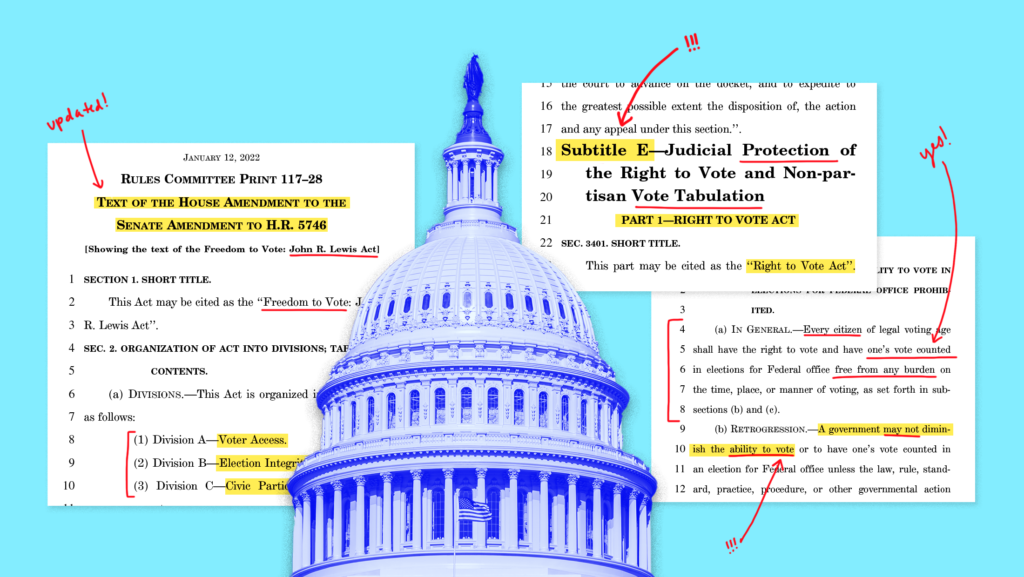The New Voting Rights Bill Is the Law We Need Right Now

Democrats have released their final bill to fight voter suppression and prevent future election subversion. The Freedom to Vote: John R. Lewis Act is, as its name suggests, a merger of the Senate’s Freedom to Vote Act and the House passed John Lewis Voting Rights Advancement Act. But the new bill does more than just combine these two landmark pieces of voting rights legislation. The new bill includes several important additions that will both prevent forms of voter suppression and combat the increased threat of election subversion.
The new bill contains most of the same minimum standards to ensure free and fair elections and protect against voter suppression contained in the prior text of Freedom to Vote. The right to register to vote is protected and expanded as is the right to vote by mail. Minimum standards for voting early and on Election Day are codified so that people who prefer to vote in person can do so conveniently and with confidence.
Through the new bill’s provisions, the Voting Rights Act (VRA) receives several, much needed, additions and expansions to combat recent U.S. Supreme Court decisions, as well as the resurgence of targeting of racial minorities through voter suppression laws and practices. The bill also combats partisan gerrymandering to ensure that voters choose their politicians — not the other way around.
The most significant changes, however, are to the expanded Right to Vote Act contained within the larger bill. I previously praised this section as the “crown jewels of the Freedom to Vote Act.” As I explained when the Freedom to Vote Act was introduced in September:
“The bill not only creates a specific “right to vote” in federal elections but guarantees it. Under the new bill, states would be prohibited from enacting laws or policies that are “retrogressive” — i.e., that make voting harder. In addition, the bill would subject significant state restrictions on the right to vote to heightened judicial scrutiny. In another small but important improvement, the new bill allows for virtually all voting rights cases to be filed in the U.S. District Court for the District of Columbia, which has the promise of creating a national, uniform pro-democracy jurisprudence.”
Building upon this strong foundation, the new bill tackles election subversion head-on. It sets out two separate rights: (1) the right to vote and (2) the right to have that vote counted.
The right to vote provision gets a much-needed update in clarifying which state restrictions are subject to probing judicial review. The new text says that “non-trivial” impairments on the right to vote must meet exacting judicial scrutiny. This will help ensure that states do not find new, creative ways to suppress voters without judges having the needed tools to strike them down.
The most important change in the new bill speaks to the second of these rights. For the first time, voters will have not just the right to vote, but a guaranteed, enforceable right to have their votes count. The new bill states plainly: “Every citizen of legal voting age shall have the right to vote and have one’s vote counted.” The bill defines that right as follows:
“…all actions necessary to have a vote included in the appropriate totals of votes cast with respect to candidates for public office for which votes are received in an election and reflected in the certified vote totals by any government responsible for tallying or certifying the results of elections for Federal office.”
In plain terms, if election officials fail to accurately count and certify election results for president, Senate, or House, there is a clear right to challenge that failure in court. And, the new law will require that case be heard quickly and under a favorable standard of review.
I cannot overstate the importance of this provision. The right to have one’s vote counted and certified is a game-changer in the fight against election subversion. This provision will be far more effective at preventing election subversion than the Electoral Count Act reforms currently being promoted by conservatives as an alternative.
That is not to say that this provision alone is enough. As I have previously written, we must also resist efforts to disconnect the fight for voting rights from the fight against election subversion. Voter suppression and election subversion are intertwined with each other. Restrictive voting laws make subversion easier and provide an excuse for those looking to disenfranchise voters after the election is complete. Without clear rules and minimum standards for voting, those looking to subvert our elections will have an easy time undermining democracy once the votes are cast.
In his recent speech in Georgia, President Biden said, “This is the moment to decide to defend our elections, to defend our democracy.” The Freedom to Vote: John R. Lewis Act is the law we need at this moment. History will be watching to see whether our elected leaders rise to the occasion.